- Serbia
Get to know Serbia
- Citizens
Culture and science
Health services
Pension and disability insurance
- Business
Employment
Economy
- Media
- Government
- Contact
Keep in touch
Contact form
Back
Keepin touch
Whether you have a question, comment, suggestion or any problem in the purview of the government, send us your message and we will try to respond as soon as possible. If your problem is not in our purview, we will forward your message to the relevant institution.
Q:
A:
Subsidising of loans to companies, citizens to be continued in 2010
Belgrade,
5 January 2010
Deputy Prime Minister and Minister of Economy and Regional Development Mladjan Dinkic said today that RSD 3.5 billion will be set aside in 2010 for subsidising loans to companies and purchase of domestic goods in the value of approximately €900 million.
Dinkic said at a briefing for reporters that owing to such subsidies, Serbia had a smaller economic drop in 2009 than other countries.
He explained that in order to achieve a faster economic recovery, it is necessary to speed up the realisation of infrastructural projects for which the funds have been set aside and to simplify procedures for doing business, first of all the obtaining of construction permits.
Dinkic explained that the interest on loans which have foreign currency index will be 4% instead of last year’s 5%, adding that the repayment period will be one year, except for the military industry for which the repayment period will be two years.
Speaking about consumer loans, Dinkic said that they will be given for the purchase of new Punto cars by exchanging old for new, for the purchase of trucks of FAP factory from Priboj and Zastava, where the annual interest rate will be 4.5%, with the repayment period of five to seven years.
Dinkic said that the government will secure RSD 2.5 billion for subsiding construction of 2,000 flats in 2010. The buyer of the flat will not pay interests on loan in the first three and the last five years, because that will be done by the state. He said that foreign direct investments this year are expected to reach $3 billion. Also, parts of some industries from the Western Europe might be moved to Serbia, which will boost its economy.
As of tomorrow, all citizens who applied for free shares will be able to pick up RSD 1,700 from the Privatisation Register.
Also, they will be able to pick up certificates on possession of five shares in the Serbian Oil Industry Naftna Industrija Srbija (NIS), whose total nominal value is RSD 2,500.
The Deputy Prime Minister said that public companies NIS, Telekom Srbija and the Nikola Tesla Airport will be obliged by law to place their shares on the stock exchange by June 30 this year, while Elektroprivreda Srbije (EPS) will be required to do so early next year.
Dinkic said that this year, the state will financially support the employment of 16,000 graduate trainees in the private sector, adding that first job competitions will be announced in February this year.
He explained that the trainees will have an obligation to do voluntary work in the first three months and during that time they will receive RSD 10,000 per month from the state. When companies decide whom to hire, they will have to make a two-year contract with the trainee.
During the first year, the trainee will receive RSD 20,000 per month from the state, together with social and health contributions paid, except for the tax on salary, which will be paid by the trainee’s employer.
He explained that in order to achieve a faster economic recovery, it is necessary to speed up the realisation of infrastructural projects for which the funds have been set aside and to simplify procedures for doing business, first of all the obtaining of construction permits.
Dinkic explained that the interest on loans which have foreign currency index will be 4% instead of last year’s 5%, adding that the repayment period will be one year, except for the military industry for which the repayment period will be two years.
Speaking about consumer loans, Dinkic said that they will be given for the purchase of new Punto cars by exchanging old for new, for the purchase of trucks of FAP factory from Priboj and Zastava, where the annual interest rate will be 4.5%, with the repayment period of five to seven years.
Dinkic said that the government will secure RSD 2.5 billion for subsiding construction of 2,000 flats in 2010. The buyer of the flat will not pay interests on loan in the first three and the last five years, because that will be done by the state. He said that foreign direct investments this year are expected to reach $3 billion. Also, parts of some industries from the Western Europe might be moved to Serbia, which will boost its economy.
As of tomorrow, all citizens who applied for free shares will be able to pick up RSD 1,700 from the Privatisation Register.
Also, they will be able to pick up certificates on possession of five shares in the Serbian Oil Industry Naftna Industrija Srbija (NIS), whose total nominal value is RSD 2,500.
The Deputy Prime Minister said that public companies NIS, Telekom Srbija and the Nikola Tesla Airport will be obliged by law to place their shares on the stock exchange by June 30 this year, while Elektroprivreda Srbije (EPS) will be required to do so early next year.
Dinkic said that this year, the state will financially support the employment of 16,000 graduate trainees in the private sector, adding that first job competitions will be announced in February this year.
He explained that the trainees will have an obligation to do voluntary work in the first three months and during that time they will receive RSD 10,000 per month from the state. When companies decide whom to hire, they will have to make a two-year contract with the trainee.
During the first year, the trainee will receive RSD 20,000 per month from the state, together with social and health contributions paid, except for the tax on salary, which will be paid by the trainee’s employer.
-
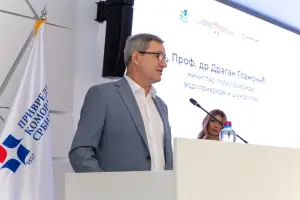 Belgrade, 11 August 2025
Belgrade, 11 August 2025Support for agricultural projects worth RSD 750 million
-
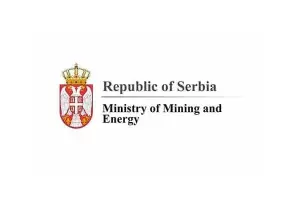 Belgrade, 21 July 2025
Belgrade, 21 July 2025Construction of oil pipeline with Hungary to begin early next year
-
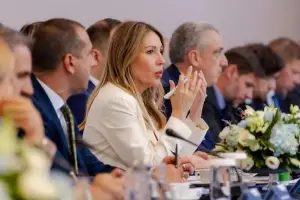 Belgrade/Athens, 17 July 2025
Belgrade/Athens, 17 July 2025Serbia continues to align with EU in field of energy
-
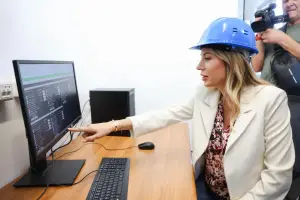 Kostolac, 14 July 2025
Kostolac, 14 July 2025First solar power plant Petka in Kostolac put into trial operation
-
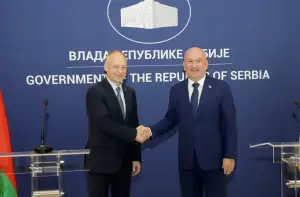 Belgrade, 11 July 2025
Belgrade, 11 July 2025Potential for improving cooperation with Belarus in many areas
-
 Požega, 5 July 2025
Požega, 5 July 2025Section of Pakovraće - Požega highway officially opened
-
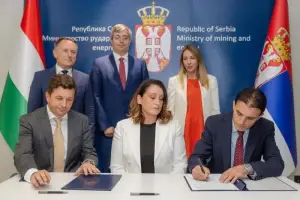 Belgrade, 2 July 2025
Belgrade, 2 July 2025Technical specifications defined for Serbia-Hungary oil pipeline
-
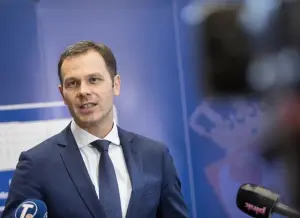 Belgrade, 30 June 2025
Belgrade, 30 June 2025IMF confirms Serbia successfully implementing all agreed reforms
-
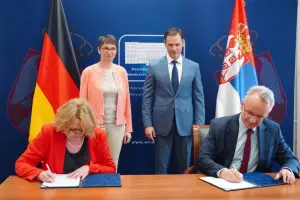 Belgrade, 27 June 2025
Belgrade, 27 June 2025Double Taxation Avoidance Agreement with Germany signed
-
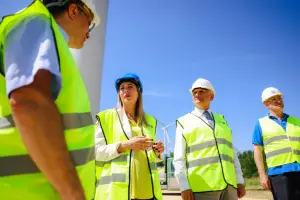 Kostolac, 25 June 2025
Kostolac, 25 June 2025Construction of Kostolac wind farm nearing completion
